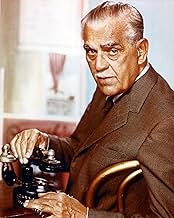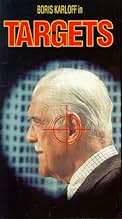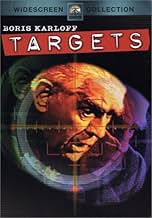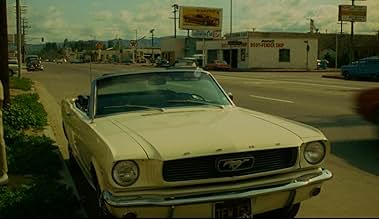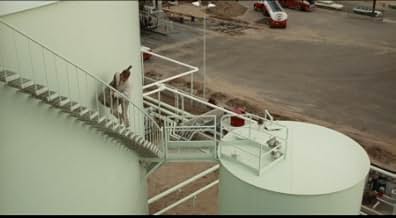Lors d'une apparition dans un cinéma drive-in, une star âgée du cinéma d'horreur affronte un vétéran psychotique de la guerre du Vietnam devenu tireur d'élite meurtrier.Lors d'une apparition dans un cinéma drive-in, une star âgée du cinéma d'horreur affronte un vétéran psychotique de la guerre du Vietnam devenu tireur d'élite meurtrier.Lors d'une apparition dans un cinéma drive-in, une star âgée du cinéma d'horreur affronte un vétéran psychotique de la guerre du Vietnam devenu tireur d'élite meurtrier.
- Réalisation
- Scénario
- Casting principal
- Récompenses
- 1 victoire au total
- Marshall Smith
- (as Monty Landis)
- Waiter
- (as Tim Burns)
Avis à la une
It establishes itself permanently in my good graces as a viewer because, by default, it provides a near documentary look, what with its plentiful use of location shooting, of Southern California circa 1967. It captures, more strikingly than any film I know, the texture of a particular time. The cars, the clothes, the signs, the drive in, the suburban houses speak subliminal volumes; it is nothing short of a neural map of a time.
This is Bogdanovich's first full directorial effort. (He had shot part of Wild Angels for Corman a while before, and Corman was impressed enough with his work there to offer him his own feature. These details and more are related in the excellent Bogdanovich commentary track that, amazingly, is included on the new "budget" DVD.) To secure the assignment, he had to agree to incorporate 20 minutes of footage from the Corman cheapie The Terror (or that was the plan at the outset) and shoot an additional new 20 minutes, or two days, with Boris Karloff. Throw in 40 minutes of your own storyline invention, and voila, instant New Drive In Movie, Roger Corman style. The project eventually grew beyond that. (The final tally: $125,000 by Bogdanovich's recollection, with $25,000 of that going to Karloff for 5 days shooting. Bogdanovich's first script killed off Karloff half way through to accommodate the budget and schedule. Sam Fuller, it was, who advised him strongly to ignore all that stuff if the story demanded more than 2 days with Karloff.)
Targets feels like a European film of its time. This says to me, above all, that Bogdanovich wanted to make certain he was making a modern film, his own film, and not an easy pastiche/homage to the American directors he had enshrined in writing before becoming a director himself-- Ford, Hawks, Hitchcock, Welles et al. I would almost call the narrative voice he assumes here passive. The absence of a film score adds to this feeling. But it is not semi-documentary; there is nothing even remotely Dragnet about Targets. It is spare, clean, modern, lacking in embellishment or decoration, but the people speak naturally, move fluidly and seem real. And there is a stillness, again a feeling enhanced by the lack of music, that creates verisimilitude, but also a general sense of unease.
The story of Targets is based on the case of Charles Whitman, the young man who climbed a tower in Texas in 1966 and staged a sniping siege on pedestrians and motorists below. An editor at Esquire had suggested this as a great film topic to Bogdanovich when he was writing some film criticism for them. Bogdanovich and his wife at the time, Polly Platt, based their first scenario on this news story, and got a major script doctor assist from director Samuel Fuller (The Big Red One; Shock Corridor, Pickup on South Street).
One of the most interesting things the new DVD commentary track points out is the number of times Bogdanovich achieved remarkable long take tracking shots. I missed them on first viewing; they are so discreetly handled that even a die-hard film fan and geek may be unaware of them. Too often, this is the sort of shot that calls a lot of attention to itself, as a flamboyant statement of the director's mastery for its own sake. It would have been easy for a first-time director to get snared in flashy games-playing. But instead, these takes are slipped seamlessly into the weave of the story, enhancing the everyday feel, the naturalism of Targets. (The best long take scene-- and one of the most telling scenes in the movie-- begins with a couple of minutes of the family sitting in the darkened living room watching The Joey Bishop Show on TV; Mom and Dad beg early work tomorrow and head off to bed; the young couple go down the hall to the bedroom, where the wife dresses for work; then we go back to the living room where Bobby sits alone for a bit watching TV. All without a cut. It is a charged, still few minutes in which Bobby makes his one and only sad little bid to talk out his inner turmoil with the person to whom he is closest.)
This doesn't even get into the touching and amusing Karloff subplot, about an old horror star resignedly coming to terms with his obsolescence. He says his type of horror can't match the horror of the modern world, and as proof he holds out a newspaper with a headline about a teenager shooting six people in a local grocery.
Small budget films do not get any better than this. --Neither do most large budget, these days. 10 stars. See it.
Despite the point being rather muddled, Targets makes up for that with the exciting way that the plot plays out and the stream of tributes and comments on Karloff's (sorry, Orlock's) career. It's nice to see Karloff enjoying himself, and the introspective nature of the movie ensures that he gets the chance to do this. Peter Bogdanovich is well known for being a director who is also a fan of cinema, and this movie also gives him a chance to tribute the medium that he evidently loves. As a fan of cinema myself, it always makes me happy to see this sort of thing, and that marks another reason for my enjoyment of this movie. The way that the plot plays out makes the movie predictable, but in a way that adds to the idea of 'real horror', as we can see what's going to come; it's like a car crash - it's obvious what's going to happen, yet all we can do is just sit back and watch. On the whole, this is a classy thriller and while it never hammers home it's point enough to ensure that you know it's actually got a point, it works because of it's tension and well paced plot. This will also be a must see movie for fans of the great Boris Karloff.
You'd think this would be a recipe for a colossal turd of a movie, but on the contrary, it pushed everyone's creativity to the max and resulted in a remarkable work of cinema.
Peter & his wife grabbed their typewriters and wrote a modern horror story contrasted against a classic Victorian horror. Assisted by Peter's friend & successful writer/director Samuel Fuller (not credited), they churned out a profound & poetic script loosely based on the news story of Charles Whitman, a former marine sniper who went on a mass shooting rampage the year before. A bit was also inspired by the Highway 101 sniper shootings in which a 16-year-old boy killed 3 motorists in 1965. That's the "modern horror" part. The Victorian horror comes with the character Byron Orlock (played by Karloff) who is a classic horror icon at the end of his career, realizing that his brand of horror is outdated.
If you can see where this is going, you're in for a great experience. Yes, it's a story of change, out with the old & in with the new, but in a chilling way I've never seen before. The idea that fear has evolved into something far different. Ghost stories & creepy characters no longer cut it. The new brand of terror is faceless, anonymous, soulless and random. Enter the phenomenon of the mass killer.
"Targets" was ahead of its time, and Peter even mentions how its release was delayed because studio execs were afraid of how its message would be received, especially with the assassinations of Martin Luther King Jr and Bobby Kennedy just months prior to release.
It is extremely relevant today, and even if it weren't so artistically done & expertly acted, I would recommend this film for its message alone. The directing, cinematography & acting is icing on the cake, and oh what icing it is! If you're like me, you probably know Boris Karloff as the lumbering creature in "Frankenstein" (1931)... a big, stiff lunk in electricians boots who drags himself around as if he's murderously constipated. Here in "Targets" he is eloquent, charming, tragic, comic and instantly worthy of our attention. My favorite scene is in a hotel room when he tells a ghost story. Director Bogdanovich is very respectful with his camera work in that scene: it opens wide and fixes itself on Karloff with its (and our) undivided attention as it slowly narrows on Karloff's face. No cuts, no jumps, no distractions, just pure Karloff.
The movie is full of thoughtful camera work like that. As you watch the film you get the idea that every camera angle, movement, pan & zoom, and every shadow and inch of background action was very carefully planned to the millimeter. I confess I've never seen a Bodanovich film, but I know he's a very respected director. Now I see why. On a tiny budget that, today, wouldn't cover the catering for a big studio film, he cranked out a magnificent film.
I would put "Targets" squarely in the class of Hitchcock, as compelling as my favorites "Rope", "Rear Window", "Vertigo" and so on. But as I mentioned earlier, it's the blending of Victorian horror (Hitchcock, Vincent Price, etc) with modern horror (Fox News, etc) that makes this an unforgettable show.
Just an epilogue to the story of how the film was made... Although prints caught the attention of major studios, it wasn't officially released until it caught the eye of a film professor who invited Paramount execs to a screening in his classroom. Paramount bought the film for $150,000 (netting Corman a whopping $25,000 profit... hope he didn't blow it all in 1 night!). The film was eventually released, and it received rave reviews from critics but never did well with the public at large. Way ahead of its time. Lucky for us it survived onto DVD 40 years later when perhaps the world will understand it better. Don't hesitate for one minute to see this film if you have the chance!
Cineaste Peter Bogdanovich's debut directing effort, sadly, to this day remains a topical hot spot. Released as it was just after the assassinations of Martin Luther King Jr. and Robert Kennedy, Targets carried much relevance even though it was hardly a success at the box office. Over the years it has come to gain a cult following that is much deserved, the low budget production value actually helping to keep it uneasily potent.
Story is structured by way of two separate narrative threads, one sees Karloff as veteran horror film actor Byron Orlock, who sees himself as an anachronism and announces his retirement from movie making. His reasoning, warranted, is that his type of horror is way behind the times, the real horror is out there on the streets, bleakly headlined in the local newspaper. The other thread concerns Bobby Thompson (O'Kelly), a handsome boy next door type who has a pretty wife but finds himself unemployed and still living with his parents. He is a ticking time bomb, his mind soon to fracture and devastation will follow. The two stories converging for a bloody finale at a drive in movie theatre, where Orlock is making a special guest appearance, the old time horror of the movies coming face to face with the real terror of the modern world.
Though uncredited by choice, the screenplay belongs to Fuller, something that Bogdanovitch has always been keen to point out, and it's with the writing where the film gets its quality factor. The messages within are serious and handled evenly by Bogdanovitch, his pacing precise and in Karloff he has the perfect icon from which to underpin the story. True enough the acting around Karloff is sub-standard, notably from the director himself, but with Bogdanovich deliberately keeping the psychological explanation for Bobby's actions vague, film manages to rise above its flaws to leave an indelible mark. 8/10
Le saviez-vous
- AnecdotesRoger Corman told director Peter Bogdanovich that he could make any film that he wanted to, on two conditions: he had to use stock footage from the film L'Halluciné (1963), and he had to hire Boris Karloff for two days (Karloff was under contract to Corman and owed him those two days). Karloff was so impressed with the film's script, however, that he refused any pay for any shooting time over his contracted two days. He worked for a total of five days on it.
- Gaffes(at about one hour and 14 minutes into the film) When Orlok's car pulls up to the drive-in theater's ticket booth, the clock says 9:10. After talking with the two men at the booth for one minute or so, the car pulls away and the clock says 9:00.
- Citations
Byron Orlok: Ladies and gentlemen, boys and girls, I'd like to leave you with a little story to think about as you drive home - through the darkness. Once upon a time, many years ago - there should be a pin spot on my face as I'm talking - once upon a time, many, many years ago, a rich merchant in Baghdad sent his servant to the marketplace to buy provisions. And after a while, the servant came back, white-faced and trembling, and said, "Master, when I was in the marketplace, I was jostled by a woman in the crowd, and I turned to look, and I saw that it was Death that jostled me. And she looked at me and made a threatening gesture. Oh, Master, please, lend me your horse, that I may ride away from this city and escape my fate. I will ride to Samara, and Death will not find me there." So the merchant loaned him the horse, and the servant mounted it and dug his spurs into its flank, and as fast as the horse could gallop, he rode towards Samara. Then the merchant went to the marketplace, and he saw Death standing in the crowd, and he said to her, "Why did you make a threatening gesture to my servant when you saw him this morning?" And Death said, "I made no threatening gesture. That was only a start of surprise. I was astonished to see him here in Baghdad, for I have an appointment with him tonight in Samara."
- Crédits fousThe film's original theatrical prints began with a written title card that read, "Why gun control? Why did a lunatic sniper kill or maim 11 innocent victims in Texas on June 3, 1966? Why were over 7,000 Americans slain or wounded by gunfire in 1967? Why in 1968 after assassinations and thousands of more murders has our country no effective gun control law? This motion picture tells a story that sheds a little light on a very dark and a very deep topic." This title card was added by Paramount Pictures only as a result of the then-recent assassinations of both Doctor Martin Luther King and Senator Robert F. Kennedy, but it was not approved by the film's director, Peter Bogdanovich at all and, as a result of this, it was removed from all later releases of the film, including those for home video.
- Versions alternativesThe film was cut for a "GP" rating only once, mainly for a 1971 re-release of it in order to capitalize on the success of Peter Bogdanovich's then-recent hit film, La dernière séance (1971). Later releases of it on home video were all uncut.
- ConnexionsFeatured in 100 Years of Horror: Boris Karloff (1996)
- Bandes originalesGreen Rocky Road
(uncredited)
Written and performed by The Daily Flash (Don MacAllister, Steve Lalor, Jon Keliehor and Doug Hastings)
Meilleurs choix
- How long is Targets?Alimenté par Alexa
Détails
Box-office
- Budget
- 130 000 $US (estimé)


